Zoom
Trash

Kitsch. Art or other objects that appeal to popular rather than high art tastes Puppy by Jeff Koons (2010) is a self-aware display of kitsch, specifically as a combination of opulence and cuteness.
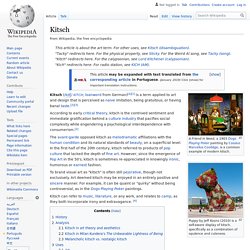
According to early critical theory, kitsch is the contrived sentiment and immediate gratification behind a culture industry that pacifies social complexity while engendering a psychological interdependence with consumerism.[2] To brand visual art as "kitsch" is often still pejorative, though not exclusively. Art deemed kitsch may be enjoyed in an entirely positive and sincere manner. For example, it can be quaint or "quirky" without being controversial, as in the Dogs Playing Poker paintings.
History[edit] Examples of kitsch in architecture The study of kitsch was done almost exclusively in German until the 1970s, with Walter Benjamin being an important scholar in the field.[6] Analysis[edit] Kitsch in art theory and aesthetics[edit]
Economic. Evolution. Finance. Human societies and cultures. Knowledge / Epistemology. Lean. Light. Literature. Math. How Much is a Million? Billion? What's the difference between a million, a billion, a trillion?
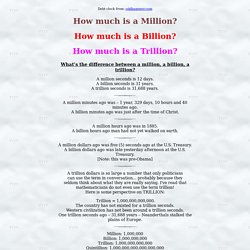
A million seconds is 12 days. A billion seconds is 31 years. A trillion seconds is 31,688 years. A million minutes ago was – 1 year, 329 days, 10 hours and 40 minutes ago. A billion minutes ago was just after the time of Christ. A million hours ago was in 1885. A million dollars ago was five (5) seconds ago at the U.S. A trillion dollars is so large a number that only politicians can use the term in conversation... probably because they seldom think about what they are really saying. Trillion = 1,000,000,000,000.
Philosophy. Physics. Politics. Psychology. Sociology. Time. Rebus. Allusional device that uses pictures to represent words or parts of words A rebus-style "escort card" from around 1865, to be read as "May I see you home my dear?
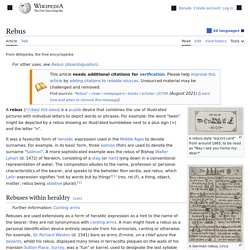
" A German rebus, circa 1620 A rebus () is a puzzle device which combines the use of illustrated pictures with individual letters to depict words and/or phrases. For example: the word "been" might be depicted by a rebus showing an illustrated bumblebee next to a plus sign (+) and the letter "n". It was a favorite form of heraldic expression used in the Middle Ages to denote surnames. The composition alludes to the name, profession or personal characteristics of the bearer, and speaks to the beholder Non verbis, sed rebus, which Latin expression signifies "not by words but by things"[1] (res, rei (f), a thing, object, matter; rebus being ablative plural).[2] Rebuses within heraldry[edit] Modern rebuses, word plays[edit] A modern example of the rebus used as a form of word play is: = Hear, or Here. p walk ark: walk in the park.
Canada. Manifest destiny. In the 19th century, Manifest Destiny was the widely held belief in the United States that American settlers were destined to expand throughout the continent.
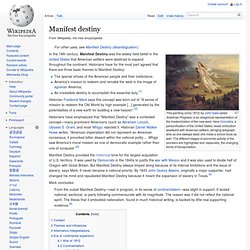
Historians have for the most part agreed that there are three basic themes to Manifest Destiny: The special virtues of the American people and their institutions;America's mission to redeem and remake the west in the image of agrarian America;An irresistible destiny to accomplish this essential duty.[1] Historian Frederick Merk says this concept was born out of "A sense of mission to redeem the Old World by high example [...] generated by the potentialities of a new earth for building a new heaven".[2] Merk concludes: From the outset Manifest Destiny—vast in program, in its sense of continentalism—was slight in support.
Context[edit] Manifest Destiny was always a general circular notion rather than a specific policy. How do people learn to cook a poisonous plant safely? (An example of culture developing) Image copyright Getty Images In 1860, Robert Burke and William Wills famously led the first European expedition across the largely unknown interior of Australia.
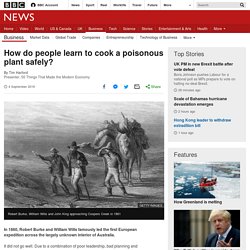
It did not go well. Due to a combination of poor leadership, bad planning and misfortune, Burke, Wills and their companion John King ran out of food on the return journey. They became stranded at a stream called Cooper's Creek, having found no way to carry enough water to cross a stretch of desert to the nearest colonial outpost at the unpromisingly named Mount Hopeless. "We have been unable to leave the creek," wrote Wills. The local Yandruwandha people seemed to thrive despite the conditions that were proving so tough for Wills's party.
The Alchemy of Time: Understanding the Great Year & the Cycles of Existence. Theory of mind.